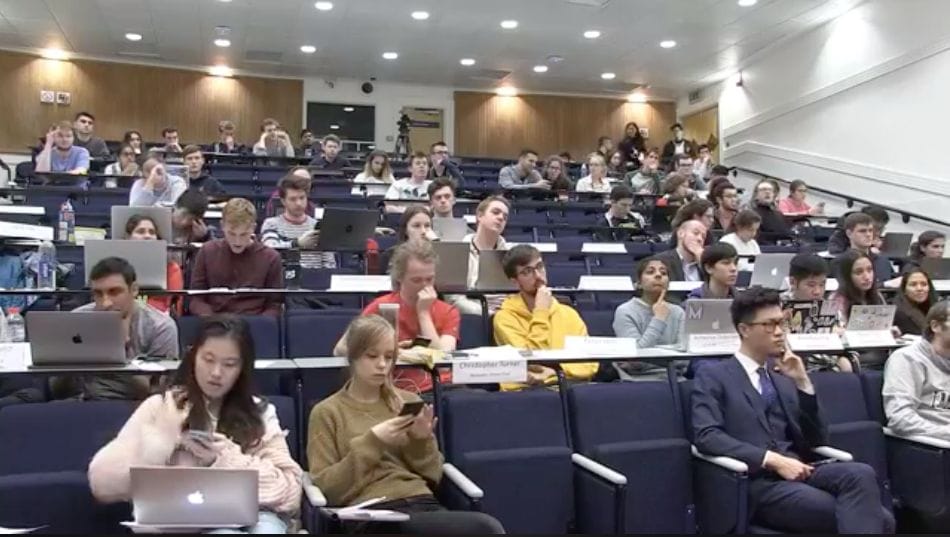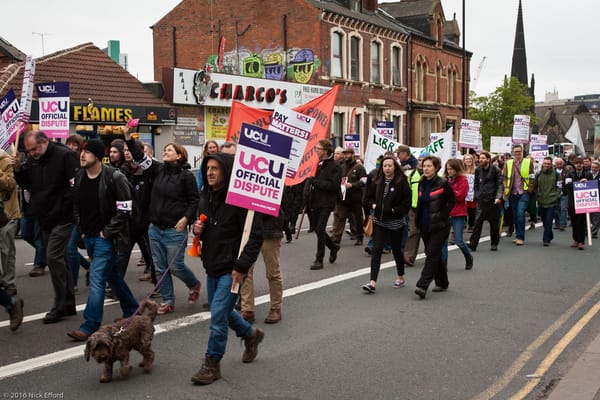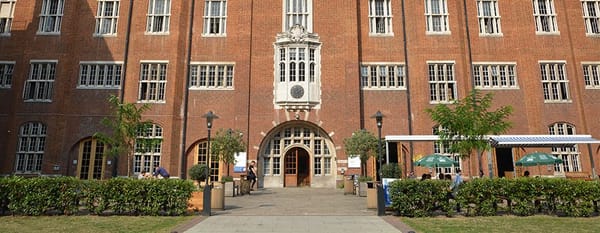Union Council Votes 36:1 to Reject Increase in Halls Rent Price
During the Union Council meeting last Tuesday, the 12.2% rent increase proposed by College was discussed, the floor was opened to students for questions and contributions, and the proposal was voted on

The Union and College are currently in negotiations over the price of rent in first-year accommodation, which College is proposing to increase by 12.2% overall in order to match a break-even model as calculated by Campus Services. On Tuesday, December 3rd, the Union President and Deputy President (Welfare) brought a paper to Union Council for votes to be taken on several aspects of the rent model. With regards to the 12.2% rent hike, this option was voted 36:1 in favour of rejecting it completely.
This session of Union Council saw around 30 non-Council members attending, who were mostly students keen to contribute their opinion on the issue that they felt would be important to them. The rent segment of Council began with the Union President and Deputy President (Welfare) detailing the circumstances.
As explained by them and as detailed in the last issue of Felix, College runs first-year student accommodation on a breakeven model, where the total cost of running the halls is offset by the revenue made from rent. This model includes only first-year residences of the accommodation portfolio – Eastside, Southside, Beit, Wilson, Pembridge, and Woodward. Xenia and Costume Store are externally owned and not considered a part of this model. The running cost is made up of expenses including staff salary, estates (security, cleaning, waste management), a fund for long-term maintenance of the hall, as well as the debt accrued from loans taken during the actual construction of the buildings. For older buildings such as Beit and Wilson, this debt has likely been nearly paid off; for newer buildings such as Woodward, the debt is aimed to be paid back over a 50 year period. This additionally means that at the end of the 50-year period, the College retains an asset that has value and that has no debt on it - a value which is not factored into their "break-even" model, and a value which is also likely to appreciate or increase over time as it is London real estate. Nonetheless, these are all paid by the rent revenue from students, regardless of whether they live in the hall in which debt is being paid off for, or whether they will ever experience the benefits of the long-term maintenance fund they are paying into.
To the best of the Union’s knowledge, new costs that are not included in the current break-even model are being added into the break-even model for 2020/21. This includes an 80% increase in the contribution towards the long-term maintenance fund, and cost for staff who work on halls off-site. These are the main reasons for the overall 12.2% rent increase, and this is what the Council has voted to reject. Without these included costs, there is a possibility that rent would not have to rise.
Each of these factors received heavy criticism from students at the Union Council meeting. One student who spoke at the Union Council meeting said: "The College's funding model is an insult to students who are meant to be financing this. They are not counting capital gains from their property holdings ... they are not counting long term appreciation ... It's a disgrace that they do this and then make us pay for it. The 12% increase in a year is ridiculous, and I really think we should question what the Union is for if they are not standing up against this."
Independently of overall rent hike, but still a necessary part of the discussion, is how in the coming years the price of rent should be distributed across halls. Currently, 27% of the freshers' cohort live in North Acton. However, in 2020/21, College will be discontinuing the use of Pembridge (100 bed spaces) for student accommodation, and furthermore, the new Kemp Porter building (700 bedspaces) in North Acton will be opening for first-year residence. These two changes to the College’s accommodation portfolio mean that 49% of freshers will be living in North Acton next year. The year before the North Acton halls opened to students, it was decided by the Union that the price per square meter of North Acton rooms versus non-North Acton rooms would be 1:2; accounting not only for the distance and travel costs incurred when travelling from North Acton to get to class, but also ensuring that there was some sort of affordable accommodation on the portfolio.
While the total revenue generated from rent must comply with an overall model decided by the College, the distribution of rent price across halls and rooms is delegated to the Union. With a changing accommodation portfolio, on top of the proposed 12.2% rent hike, things get much more complicated. In the original paper brought to Council, the Union President and Deputy President (Welfare) laid out four potential options for how this 12.2% increase could be distributed across North Acton and South Kensington halls (any hall that is not in North Acton is considered to be South Kensington-centric). These options ranged from a flat increase of 12.2% across all halls, to a 20% North Acton increase and 8% South Kensington increase. The decision on price distribution largely depends on balancing the availability of affordable housing options for first-year students whilst simultaneously avoiding splitting the fresher cohort into North Acton/South Kensington communities that have large wealth disparities. First-year halls are crucial to building a community where the student body is well integrated and everyone feels a sense of belonging; this would be incredibly difficult to achieve if the price gap between South Kensington and North Acton halls were to grow much larger, which would essentially segregate students by wealth.

Though the 12.2% hike was ultimately voted down by Union Council, College is under no real obligation to comply with this decision. Union President Abhijay Sood has said about the Council’s rejection of the rent hike, "The preference of College Campus Services would have been for Union Council to accept their break-even model, and endorse one particular version of what they put forward. Union Council did not feel that they could endorse that, and Shervin (Deputy President (Welfare)) and I did not personally feel we could endorse that because of how steep the proposed increases are. We went back to them and they have expressed a willingness for us to work together to get through this impasse.
“We have established that we have a lot of common ground - we all want to reach an agreement, we want to agree something and to do so in a relatively tight time frame, and we want students to be treated fairly and for as many students as possible to live in halls as a first-year, as it's very positive for the student experience. We also all want the College to be financially solvent; we don't want the College's finances to be bad, because that damages students too. This common ground, we can use to proceed. We won't be giving minute-by-minute updates because it would be unfair on both us and College, but we really do believe an agreement can be reached, and if it can then we will be bringing that agreement back to Union Council on January 21st as a public meeting.”
With a 12.2% rent hike, the price of living in halls is no longer much different from the market rate of real estate. A single room in Beit, which currently costs £235/week would be projected to cost £264/week following a flat 12.2% increase.
Also discussed at Union Council was the unfairness of the rent increase for students living in Eastside/Southside/Beit, not because of preference but because of health conditions. Students whose physical or mental wellbeing are unfit are guaranteed accommodation in these halls as returning students because of their proximity to campus. Students asserted that any further price hike would be unjust because they are not living in these halls by choice, but rather because their conditions necessitate them to.
There was also discussion about how the price of rent could be subsidised for Hall Seniors, who currently take on the role entirely on a voluntary basis. This has been in discussion for a while; in a session held last year by the previous Deputy President (Welfare) Becky Neil, hall seniors were asked how the Union and College could show their appreciation for the work that they do, and some of the suggestions included a 10% rent subsidy. The Council voted in favour of reducing rent for Hall Seniors, but with no further specifics given the rejection of the overall model and the necessity for further negotiation with the College. Also passed by Council was a decision to slightly reduce the rent of several rooms on the Lower Ground floor in Southside and Eastside, whose windows faced a wall and meant they received extremely limited sunlight.
After the Union Council session ended, Felix and ICTV interviewed students as well as Council representatives about their view on the rent increase and the breakeven model, the video of which will be released on Felix’s Facebook page as part of their "Lifting the Rock" series. There was broad consensus about the importance of rent price in choosing first-year accommodation, corroborating the idea that the North Acton/South Kensington price gap is a fairly sensitive issue that the Union must handle. The Council session itself was live-streamed and the full video can be found on the Union Facebook page.
The College did not accept a request for interview, but a College spokesperson did comment: “we are continuing our conversations with the Union on a rent framework agreement so we can keep providing high quality and fairly priced accommodation for our student community.”








